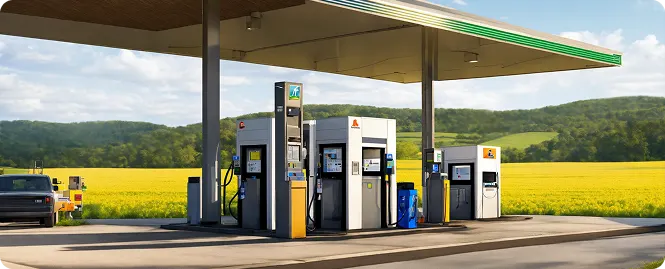How to Open a Gas Station in North Carolina
Table of Contents
Key Takeaways
-
Before opening a gas station in North Carolina, research high-traffic areas, local demand, and competition. A prime location with easy accessibility and visibility ensures steady customer flow and higher profit margins.
-
A well-structured business plan should include startup costs, projected revenue, marketing strategies, and business structure (e.g., sole proprietorships or limited liability companies). Investors and lenders require a clear plan before approving funding.
-
Gas station owners must secure permits, licenses, and environmental clearances while also exploring business loans and funding options. Compliance with state and federal regulations is key to a smooth operation.
-
Selecting reliable suppliers, from gas pumps and fuel storage tanks to a convenience store setup or car wash, ensures efficiency and long-term success. Negotiating supplier contracts helps manage costs and maintain consistent inventory.
-
A strong marketing strategy, including social media promotions, loyalty programs, and local partnerships, helps attract customers. Additionally, routine maintenance, staff training, and customer service excellence keep the gas station and convenience store profitable.
North Carolina’s gas station industry is a thriving sector driven by high consumer demand and growing vehicle ownership. With strategic location selection and effective business management, gas station businesses can achieve strong profit margins. Many gas station owners increase their revenue by incorporating additional services such as convenience stores, car washes, or food services. However, success depends on careful planning, operational efficiency, and competitive pricing to stand out in this highly competitive market.
Opening a gas station in North Carolina can require more than just securing a good location. Each step plays a critical role, from choosing a business structure and writing a business plan to obtaining the right permits, licenses, and financing. Gas station businesses must also comply with environmental regulations and establish reliable fuel supply contracts. A well-researched approach will help ensure a smooth launch, long-term sustainability, and financial success in a competitive industry like this.
Step 1: Researching the Market and Location
Choosing the right location is a game-changer when you’re looking to open a gas station in North Carolina. High-traffic areas near highways, intersections, and shopping centers attract steady customers. Consider factors like proximity to residential neighborhoods, trucking routes, and convenience stores for added foot traffic. Additionally, evaluating zoning laws, land costs, and environmental factors ensures long-term success. A well-placed gas station can increase profit margins and establish a loyal customer base in a competitive market.
Understanding local demand, traffic patterns, and competition is crucial when opening a gas station in North Carolina. Research high-traffic roads, commuter routes, and fuel consumption trends to identify profitable locations. Study your competitors—what services do they offer, and where are they lacking? Avoid oversaturated markets and look for underserved areas with high demand. Factors such as population growth, business developments, and tourism hotspots can significantly make an impact on profit margins and long-term business success.
Consumer needs vary across North Carolina’s regions – urban customers may seek competitive pricing and premium fuel, while rural customers prioritize diesel availability and 24/7 service. Offering value-added services such as car washes, EV charging stations, or food options based on local demand can help your gas station stand out.
Step 2: Creating a Business Plan
A well-crafted business plan is crucial when considering opening a gas station in North Carolina. It serves as a roadmap that guides you through startup costs, operational strategies, and growth projections. A strong plan also helps secure business loans and investments by demonstrating profit potential. Consider factors like target market, location strategy, and competitive advantages. Whether launching a gas station franchise or an independent station, a detailed plan increases your chances of long-term success.
Your business plan should thoroughly outline financial projections, profit margins, and revenue goals to help secure proper funding. You may want to include an effective marketing strategy highlighting brand positioning, customer engagement, and promotional tactics. Add detailed operational costs, inventory management, and staffing needs to ensure smooth operations. Also, consider business structure options, such as sole proprietorships or limited liability companies (LLCs), to determine the best legal and financial setup for your gas station.
A successful gas station isn't just about how the opening goes—it’s about sustained growth. Establish scalable business models, such as expanding to multiple locations, adding a car wash, or integrating EV charging stations. Focus on building a loyal customer base through loyalty programs and strategic pricing. Additionally, keep an eye on market trends, fuel innovations, and consumer behavior to adapt and remain competitive. A long-term vision ensures steady revenue and a thriving gas station business.
Step 3: Legal and Regulatory Requirements
Before opening a gas station in North Carolina, you must obtain the necessary permits, licenses, and business registrations. This includes securing a business license, Employer Identification Number (EIN), and sales tax permit. Gas station owners should apply for fuel distributor permits, underground storage tank (UST) registrations, and environmental permits. Additional licenses will be required if you plan to include a convenience store, car wash, or lottery sales. Proper documentation ensures legal compliance and smooth operations.
Zoning laws dictate where you can or cannot build and operate a gas station. Local regulations determine minimum lot sizes, traffic flow considerations, and distance requirements from schools or residential areas. Compliance with fire codes, accessibility standards, and safety protocols is critical. Before purchasing the land, consult with local zoning authorities to confirm it is suitable for your gas station business. Meeting these requirements will help prevent delays and ensure a smooth, hassle-free approval process.
Environmental regulations play a vital role in gas station construction and operation. Business owners must comply with state and federal fuel storage laws, ensuring leak prevention measures, regular tank inspections, and proper waste disposal. North Carolina mandates environmental impact assessments and spill prevention plans in order to protect groundwater and soil quality. Including an environmental contingency clause in supplier contracts can help mitigate risks. Understanding these regulations is essential for sustainable and legally compliant operations.
Step 4: Securing Financing
Securing funding is a critical step in opening a gas station in North Carolina. Business owners can explore traditional bank loans, Small Business Administration (SBA) loans, private investors, or franchise financing. Many owners opt for business loans to cover startup costs, equipment purchases, and initial fuel inventory. Alternative funding sources like crowdfunding or angel investors can help secure capital. Choosing the right financing option depends on your credit score, business structure, and long-term financial goals.
To attract lenders or investors, you will need to craft a solid business plan and well-prepared financial documents. This may include profit margin estimates, projected expenses, startup costs, and break-even analysis. Banks and investors will assess your personal assets, credit history, and repayment capacity before approving to lend a loan. Business owners should provide a detailed budget, cash flow statements, and market research to clearly demonstrate the profitability and sustainability of the gas station business.
Small business owners in North Carolina may qualify for government grants, tax incentives, or low-interest loans. Programs like the SBA’s 7(a) Loan Program, the Rural Energy for America Program (REAP), and state-funded economic development grants can help cover costs. Some programs support gas stations in underserved areas or those investing in eco-friendly fuel alternatives. Researching available grants and submitting a strong application with a clear growth strategy can reduce startup costs and financial risk.
Step 5: Selecting the Right Equipment and Suppliers
To successfully open a gas station in North Carolina, you need the right equipment to ensure smooth operations and customer satisfaction. Key components include fuel dispensers, underground or above-ground storage tanks, point-of-sale (POS) systems, security cameras, and air pumps. Modern POS systems help streamline transactions and track sales, while automated fuel monitoring systems prevent shortages. Investing in high-quality gas pumps and digital signage enhances efficiency and attracts customers to your gas station and convenience store.
Finding trustworthy fuel suppliers will help you maintain consistent fuel availability and toggle with competitive market pricing. Gas station owners should compare wholesale fuel rates, supply agreements, and contract terms with their own before committing to a specific supplier. Consider factors such as delivery schedules, fuel quality, and pricing flexibility. Negotiating a long-term contract with a supplier can help you lock in stable fuel prices, reduce the impact of market fluctuations, and maximize profit margins.
Beyond fuel sales, adding complementary services can significantly boost profitability. A well-stocked convenience store can generate steady income from snacks, beverages, and everyday essentials. You may consider adding a car wash, auto repair services, or electric vehicle (EV) charging stations to attract a broader customer base. Many successful gas station businesses partner with popular food chains or coffee shops, increasing foot traffic and encouraging repeat business. Diversifying services ensures higher customer retention and long-term growth.
Step 6: Building and Designing the Gas Station
Building a gas station and convenience store requires careful planning to ensure functionality, aesthetics, and profitability. The layout should maximize traffic flow, allowing vehicles to enter, exit quickly. Consider canopy placement for weather protection, high-visibility signage, and adequate parking spaces. Inside the store, an efficient checkout counter, organized product displays, and a clean atmosphere encourage customer satisfaction. Thoughtful lighting and landscaping can enhance curb appeal and attract customers to your gas station business.
Safety and accessibility are non-negotiable when opening a gas station in North Carolina. Compliance with local building codes, fire regulations, and ADA (Americans with Disabilities Act) standards is crucial. To prevent hazards, install leak-proof fuel storage tanks, fire suppression systems, and well-lit fueling areas. Ensure accessible entry points, ramps, and wide aisles for customers with disabilities. Partnering with engineers and regulatory experts helps meet legal requirements while ensuring a safe environment for employees and customers.
A clear store layout, easy-to-navigate aisles, and strategically placed impulse-buy items near the checkout can enhance the customer experience. Comfortable seating areas, clean restrooms, and self-service kiosks can set your gas station apart from competitors. An inviting design with modern touches will help encourage repeat customers and long-term business growth.
Step 7: Hiring and Training Employees
Building a successful gas station and convenience store starts with hiring the right employees. Look for reliable, customer-focused individuals for cashier, maintenance, and managerial roles. When hiring, prioritize strong communication skills, problem-solving abilities, and previous retail or fuel industry experience. Posting job openings on local job boards, social media, and recruitment sites can help attract qualified candidates. Conduct background checks and structured interviews to ensure you hire trustworthy staff who can handle daily operations efficiently.
Proper employee training is essential in order to ensure smooth gas station operations. Make sure that your employees are well-versed in safety protocols, handling fuel-related emergencies, and compliance with local regulations. Comprehensive customer service training will improve customer satisfaction and retention. Teaching Point of Scale (POS) system operation, inventory management, and basic troubleshooting will add to improving overall efficiency. Providing ongoing training sessions keeps employees updated on new procedures, fostering a knowledgeable and confident workforce.
A well-organized scheduling system ensures adequate staffing during peak hours while controlling labor costs. Use digital scheduling tools to manage shifts and reduce conflicts. An automated payroll system simplifies wage calculations, tax deductions, and direct deposits. Efficient staff scheduling and payroll management contribute to a well-run gas station and satisfied employees.
Step 8: Marketing and Promotion
A strong local advertising strategy is key to a successful gas station and convenience store launch. Use billboards, direct mail campaigns, and local newspaper ads to create awareness. Hosting a grand opening event with special discounts and giveaways can attract initial foot traffic. Partner up with radio stations and community influencers to spread the word. Ensure your business is listed on Google My Business and local directories so potential customers can easily find your location.
Social media can be a powerful tool when it comes to engaging with your community. Use platforms like Facebook, Instagram, and Twitter to announce promotions, share fuel price updates, and highlight special offers. Implement a loyalty program that rewards frequent customers with discounts or free items. Offer limited-time promotions on fuel, car washes, or snacks to drive repeat business. Making engaging content and implementing regular customer interactions will help drive a more loyal customer base.
Forming strategic partnerships with local businesses can increase store’s visibility and foot traffic. Collaborate with rideshare drivers, trucking companies, or nearby restaurants to offer mutual discounts. Sponsoring community events, school programs, or local sports teams can help in creating a positive reputation and encourage long-term customer loyalty for your business.
Step 9: Ongoing Operations and Maintenance
Running a gas station and convenience store requires efficient inventory management and pricing strategies. To achieve this, keep track of fuel levels, food, and retail stock using a reliable point-of-sale (POS) system. Adjust fuel prices based on market trends and competitor pricing to stay competitive. Implement automated reordering systems to prevent stockouts. Regularly analyze sales data to identify high-demand products and adjust inventory accordingly. A well-organized operational workflow ensures smooth business functioning and maximized profitability.
Maintaining a safe and clean environment in your gas station is crucial to building customer trust and ensuring regulatory compliance. Inspect fuel dispensers, storage tanks, and safety equipment on a regular basis to prevent leaks or hazards. Follow OSHA and EPA regulations to ensure environmental and employee safety. Keep the store, restrooms, and forecourt clean to enhance customer experience. Train employees on emergency response protocols and conduct routine safety drills to handle unexpected incidents efficiently.
Use surveys, online reviews, and direct customer interactions to gather insights. Address complaints promptly and professionally, demonstrating a commitment to customer satisfaction. Implement loyalty programs and personalize services based on their feedback to retain customers. Analyzing customer preferences helps introduce new services or optimize existing ones, ensuring long-term business success.
Conclusion
Opening a gas station in North Carolina involves certain key steps, which include conducting market research, choosing the right location, securing permits and financing, selecting equipment and suppliers, hiring staff, and launching effective marketing strategies. Ongoing operations, maintenance, and customer service ensure long-term success in the competitive gas station industry.
Insurance protects gas station and convenience store owners from financial risks, including property damage, theft, liability claims, and employee-related incidents. Policies like general liability, workers’ compensation, and business interruption insurance protect personal assets and ensure business continuity. Having the right coverage minimizes unexpected losses and keeps your business financially secure.










